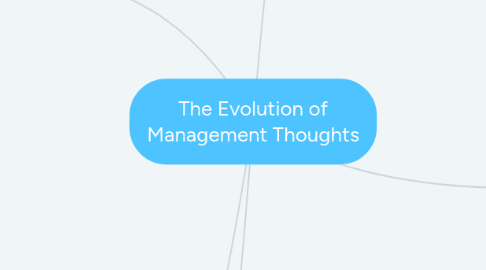
1. Behaviorism, Human Relations & Behavioral
1.1. Influenced by human behavior
1.2. Discover and recognize the importance of the informal of organization.
1.3. Managers needs to motivate and leads subordinates.
1.4. Human Resources approach and human relation approach.
1.5. Mary Parker Follet
1.5.1. The importance of organizational encouragement was emphasized, which could be achieved by teamwork and managers harmonizing group effort.
1.5.2. Principles of coordination
1.5.2.1. Needs to reflect direct contact with people
1.5.2.2. Coordination is continuous on going process
1.5.2.3. Found in the initial stages of endeavor
1.5.2.4. Reciprocal process inherent in all group situation
1.6. Elton Mayo - The Hawthorne Studies
1.6.1. People are motivated because they perceived that "the management group" (high status) is paying attention to them.
1.6.2. Shows the informal "human" elements within organization
1.7. Maslow's hierarchy of needs
1.7.1. Physiogical
1.7.2. Safety
1.7.3. Social
1.7.4. Esteem
1.7.5. Self-actualization
1.8. Douglas McGregor
1.8.1. Theory X
1.8.1.1. Pessimistic and negative view of workers
1.8.1.2. Workers are irresponsible, resistant to change, lack ambition, hate work and want to be led.
1.8.2. Theory Y
1.8.2.1. Optimistic and positive view of workers
1.8.2.2. Workers are considered capable of accepting responsibility, self-direction, self control and being creative
2. Quantitative Viewpoints: Management Science & Operation Research
2.1. Teams working on process research used mathematical methods to solve management problems by modelling and analysis.
2.2. Management science is a formalized operation research procedure. It employs mathematical models and computers to aid in future forecasting based on past and present activity.
3. Contemporary Approach
3.1. Application of managerial concepts depends on environment, people and tasks to be accomplished.
3.2. System Approach
3.2.1. A system is a set of interrelated and interdependent parts arranged in
3.2.1.1. Open systems
3.2.1.1.1. recognizes that the organization depends on the environment. Organizations are known to be inter dependent on other organizations
3.2.1.2. Close systems
3.2.1.2.1. Nor interact with their environment. It is aware and sensitive to the sub-system
3.3. Contingency Approach
3.3.1. Also known as situational approach
3.3.2. Managers must recognize and respond to situational variables such as firm size, employee attitudes, resource differences, objectives, product output, task performed, and the firm's strategy.
3.3.3. Proposes that there is not one best approach to management to ALL situations.
3.3.4. Most practical because it addresses problems on a case-by-case basis.
4. Scientific Management
4.1. emphasized the scientific study of job methods in order to increase individual worker productivity.
4.2. Principles of Scientific Management
4.2.1. Scientifically study each part of the task
4.2.2. Carefully select workers with the right abilities
4.2.3. Give workers the training and incentives to do the task
4.2.4. Use scientific principles to plan the work methods
4.3. Henry L. Gantt (1861-1919)
4.3.1. Taylor's incentive scheme for both supervisors and staff was re-examined.
4.3.2. Introduced : "Gant Chart"
4.4. Frank B. & Lillian M. Gilbreth
4.4.1. Encourage worker to do a good job
4.4.2. Perform it well, train other worker
4.4.3. Make him more efficient and experience and gives opportunity to prepare for promotion.
5. General Administrative Theory
5.1. Max Weber
5.1.1. Ideal-bureaucracy
5.1.1.1. Defined hierarchy of authority
5.1.1.2. Comprehensive system of rules and procedures.
5.1.1.3. Clear division of work
5.1.1.4. Impersonal employer
5.1.1.5. Promotion and selection criteria based on technical competence
5.2. Henri Fayol
5.2.1. Focus on manager and funtions they perform
5.2.2. Believed that management based on planning, organizing, commanding, coordinating and controlling.
5.2.3. Opposed on "managers are born not made"
5.2.4. Principles of Management
5.2.4.1. Division of work
5.2.4.2. Authority
5.2.4.3. Discipline
5.2.4.4. Unity of command
5.2.4.5. Unity of direction
5.2.4.6. Subordination of individual interest to the general interest.
5.2.4.7. Remuneration
5.2.4.8. Centralization
5.2.4.9. Scalar chain
5.2.4.10. Order
5.2.4.11. Equity
5.2.4.12. Stability of tenure of personnel
5.2.4.13. Initiatives
5.2.4.14. Esprit de corps
